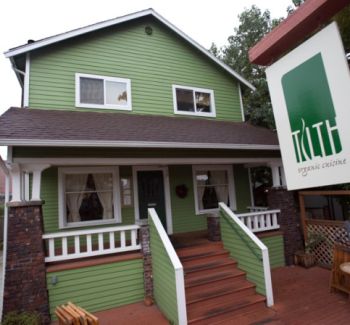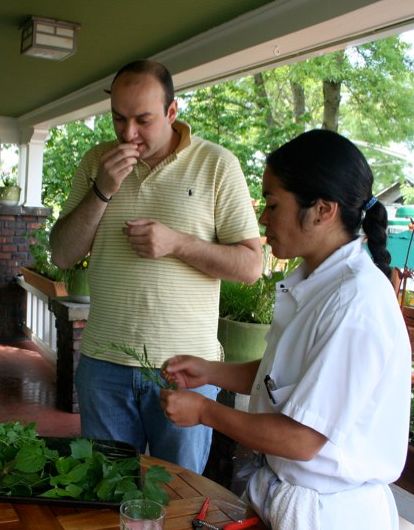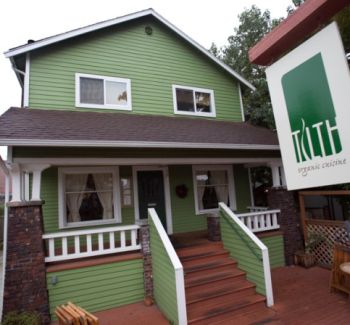 Photo: Ron WurzerSeattle chef Maria Hines has cooked up an award-winning recipe for success: serve sustainable, organic foods from your local area in a welcoming atmosphere with a neighborhoody feel. The resulting dish? Tilth.
Photo: Ron WurzerSeattle chef Maria Hines has cooked up an award-winning recipe for success: serve sustainable, organic foods from your local area in a welcoming atmosphere with a neighborhoody feel. The resulting dish? Tilth.
Nestled in small green home in Seattle’s Wallingford neighborhood, it’s only the country’s second restaurant to receive organic certification from Oregon Tilth, a distinction that promises 95 percent organic offerings and eco-responsible business practices. And its savory sups just won Hines a coveted James Beard Award — essentially the Oscars of the foodie world.
Curious about her strong commitment to sustainable foods and her advice for cash-strapped organic-food shoppers, I spoke with Hines just after her return from the James Beard Award festivities in New York City.
Q. What does this award mean to you?
A. More than anything, it’s recognition from the industry and from your peers in the industry, so it means a lot. We work very hard in this industry and to be recognized by one another is a big deal for sure.
Q. You cooked for the gala reception after the award ceremony — what did you make?
A. Skagit River Ranch beef carpaccio with asparagus, sorrel, and horseradish crème fraîche.
Q. So you brought local foods from the Seattle area out to New York for the event?
A. I sure did. The asparagus was from Yakima and the beef was from Sedro-Woolley, which is northern Washington.
 Maria Hines (right) with Tilth General Manager Adam Chumas.Q. Yours is the second restaurant in the country to be certified organic by Oregon Tilth. Why did you decide to make that commitment?
Maria Hines (right) with Tilth General Manager Adam Chumas.Q. Yours is the second restaurant in the country to be certified organic by Oregon Tilth. Why did you decide to make that commitment?
A. Because I think a lot of people tend to put “we are sustainable and organic as much as we can” and how do you quantify “as much as you can” — is it as much as you can afford, or as much as is convenient?
I eat organically at home but there isn’t really anywhere you can go where you know you’re getting good, healthy, clean organic food. I figured I might as well open up a place so people have that place to go where they know that the food is 95 percent certified organic.
Q. And you also have a commitment to serving local foods as well.
A. You can be organic but oddly enough not be sustainable at the same time, in my opinion … So we try to buy as local of foods as we possibly can so that we’re being as sustainable as we’re being organic.
Q. Do you see the restaurant industry as a whole moving in this direction?
A. I don’t know; I hope so. I really hope it’s not a fad. Now the movement has a lot of momentum, and I really hope that continues, and I think that it will.
Q. One thing on everyone’s minds these days when trying to eat well is cost — whether at the grocery store or out at a restaurant. Do you have any tips as to how to make good food purchases while sticking to a tighter budget?
A. I would say definitely cook food from scratch using whole, organic foods; that will be cheaper than going out and purchasing it. And grow an organic garden.



